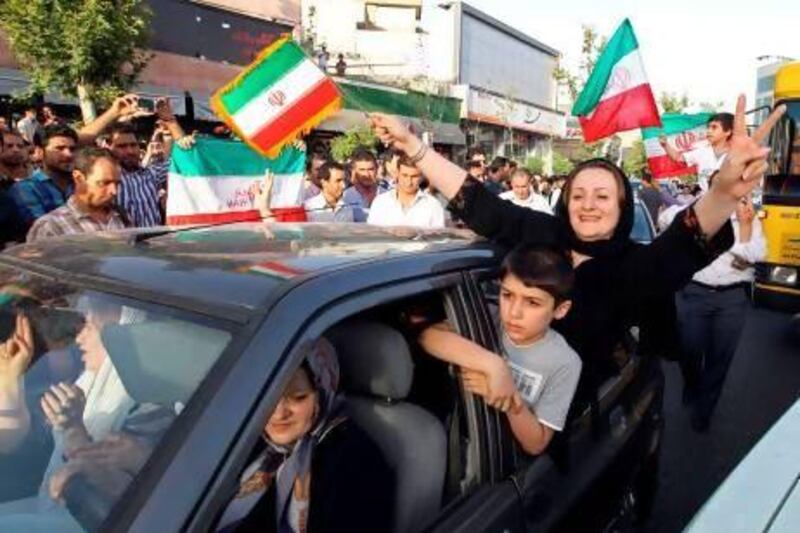For the second time in days, Iranians, who have had little cause for cheer in eight years, have been dancing in the streets.
There was an explosion of joy in their fun-starved nation when its beloved national football team won a prized ticket to next summer's World Cup finals in Brazil with a 1-0 away victory over South Korea on Tuesday.
This followed a weekend of celebrations after Hassan Rowhani, a moderate who promised greater freedoms, won an unexpected victory over hardliners in the presidential election.
"I feel like God is answering all our prayers at once," said Nasim, a 24-year-old from Tehran. "First a new, different president, and now the World Cup. We're beside ourselves with happiness."
"Brazil, here we come," jubilant men, women and children chanted as they celebrated on the streets of Tehran amid the blare of car horns and flashing headlights.
Many had daubed their faces with the red, white and green of the Iranian flag, some waved pictures of Mr Rowhani, and others wore purple wristbands, the colour of his election campaign.
Football and politics are a volatile mixture in many countries but they are more combustible in Iran than most. Victories and defeats for the national team have previously ignited anti-government protests.
In addition to purple, many revellers in Tehran were wearing green, the colour of the reformist opposition in 2009 whose mass street protests against Mr Ahmadinejad's "stolen" re-election were ruthlessly suppressed.
"Mousavi, Karrubi, we qualified for the WC [World Cup]," people chanted defiantly in Tehran, referring to the two reformist candidates who ran against Mr Ahmadinejad four years ago, and who have been under house arrest since early 2011.
Mr Rowhani has pledged to free political prisoners, but whether he manages to do so will be an early test of his mettle.
The regime in Tehran is usually wary of street rallies but has not tried to break up the heady celebrations of Mr Rowhani's victory or those for the national football team.
The establishment is seemingly tolerating the street celebrations, viewing them as a pressure valve for people to release their frustrations.
Many Iranians blame the regime's ham-fisted handling of the economy, rather than international sanctions, for their economic woes, which include soaring inflation and high unemployment.
Unsurprisingly, Iranian officials across the political spectrum have rushed to congratulate their country's footballing heroes - and bask in some reflected glory.
Mr Rowhani declared he was immensely proud: "I am certain this victory is the prelude for major victories and the decisive presence of Islamic Iran in all fields."
Iran's dour supreme leader, Ayatollah Ali Khamenei, lauded the team for bringing "happiness" to the people of Iran.
Even wary cynics on social networking sites were euphoric.
"Now it's Samba time, Iranian-style," one person posted on Facebook. Another said: "I think we've all died and we're now in heaven."
The celebrations were reminiscent of the delirious moment in December 1997 when Iran qualified for the 1998 World Cup in France and was drawn against the United States in the first round. There were wild street parties in Tehran, where Mohammad Khatami, the reformist president, had come to power months earlier.
Iran went on to beat the US 2-1 in the tournament six months later, a victory that sparked tumultuous celebrations in the capital, with men and women partying together in the streets.
Before the kick-off in Paris for that match, the Iranian team gave flowers to the American players as a gesture of goodwill. Bill Clinton, then the US president, also broadcast a message of goodwill during the game.
But, at the other extreme, nationwide riots erupted in 2001 after Iran was eliminated from the 2002 World Cup finals by Bahrain, a minnow among the world's footballing nations.
In 2009, when Mr Ahmadinejad was returned to power in a fiercely disputed election, Iran crashed out to South Korea in a World Cup qualifier that denied the Islamic Republic a place at the finals in South Africa.
Many Iranians have suggested their national football team is on a winning streak now that Mr Rowhani will assume power in August. Many joked that their football stars only perform well when moderate leaders, such as Mr Khatami or Mr Rowhani, are in power.
Britain's labour leader, Harold Wilson, made a similar quip decades ago, referring to England's sole World Cup triumph in 1966.
He said: "Have you ever noticed how we only win the World Cup under a Labour government?"
[ mtheodoulou@thenational.ae ]
twitter: For breaking news from the Gulf, the Middle East and around the globe follow The National World. Follow us





